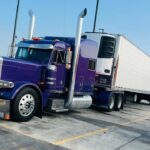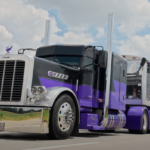A proposed legislation in California is progressing through the state legislature, aiming to hinder the advancement of autonomous heavy trucks on state roads.
Starting from 2015, the use of self-driving trucks on California roads has been forbidden. Nevertheless, the law does permit the testing and operation of autonomous vehicles weighing less than 10,000 pounds, provided they don’t require a human driver.
Presently, the state’s Department of Motor Vehicles is reviewing potential modifications to the existing ban on autonomous trucks.
Autonomous truck restriction
Assemblymember Cecilia Aguiar-Curry, a representative from the Democratic Party hailing from Winters, is spearheading a proposed bill that aims to tackle a potential change in regulations. The bill she is championing, known as AB316, seeks to place restrictions on the usage of autonomous trucks on California’s roadways.
To be more specific, AB316 would make it illegal for autonomous vehicles weighing 10,001 pounds or more to be operated for testing purposes, transportation of goods, or transportation of passengers without the presence of a “human safety operator” inside the vehicle during its operation.
Additionally, the Department of Motor Vehicles (DMV) would be required to submit a policy report after a minimum of five years of testing. Following that, a legislative oversight hearing would take place. If approved by the legislature, the DMV would still need to wait for another year before issuing permits.
During a recent Senate Transportation Committee hearing on the bill, Assemblymember Aguiar-Curry emphasized the necessity of her bill, stating that it serves as a crucial safeguard for the introduction of autonomous trucks on state roads.
“Testing and deployment of light-duty autonomous vehicles in California has been fraught with malfunctions, including autonomous vehicles blocking traffic by suddenly stopping in the middle of the road, driving through emergency response scenes, impeding emergency vehicles, and causing accidents.”
Furthermore, Assemblymember Aguiar-Curry emphasized that the presence of a human operator does not hinder the testing and deployment of autonomous vehicles within California. According to her perspective, the requirement of a human operator does not pose a barrier to the progress of the autonomous trucking industry in the state.
“The only conceivable motivation for rushing forward without a monitor in the cab is to increase profits at the risk of public safety, and the livelihoods of our trained expert trucking workforce,” Aguiar-Curry testified.
Opponents of the bill argue that it imposes excessive limitations and restrictions. They raise concerns about whether lawmakers should be heavily involved in regulating the autonomous trucking industry.
Despite these criticisms, the bill managed to gain traction as the Senate Transportation Committee voted unanimously to move it forward. AB316 now awaits further deliberation in the Senate Appropriations Committee before it can proceed to the Senate floor for a full vote.
If the bill receives approval in the Senate, it will then proceed to the governor’s desk for final consideration. It’s worth noting that the bill already received significant support from Assembly lawmakers, who voted 69-4 in favor of its approval back in May.
OOIDA welcomes legislative action
According to the Owner-Operator Independent Drivers Association (OOIDA), they acknowledge that autonomous technologies have the potential to enhance safety under specific circumstances. However, the association also believes that these technologies introduce new risks that can lead to hazardous outcomes.
Todd Spencer, the President of OOIDA, further emphasizes that comprehending the complete impact of autonomous vehicles on the trucking industry is a complex task. Given the uncertainties surrounding this emerging technology, the association remains cautious about its potential effects on truck drivers and the industry as a whole.
“Without more data about how AVs will function and their impact on the industry, OOIDA is concerned that legislators and regulators will put on blinders and push for more technology as the answer to the industry’s problems without considering the negative impacts of these technologies,” Spencer wrote in a previous letter to Aguiar-Curry. “It is difficult to fully understand what effect AVs will have on the trucking industry.
“Regardless of their potential, it is important to understand the implications that AVs will have on public roadways.”
In addition to safety concerns, Spencer said it is important for California to “more fully consider the practical implications that eliminating the human driver from the cab might have on the economy.”





